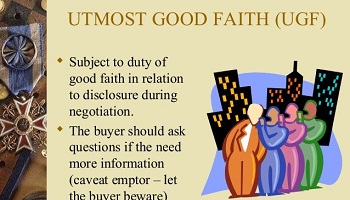Utmost Good Faith in Insurance: Essential Principle, how it applied to the insurer and insured in the proposal. Utmost good faith, or Uberrimae Fidei, is a key principle in insurance law. It requires everyone involved in an insurance contract to act honestly and disclose all relevant information. The insured must provide accurate details to the insurance company, which also must act in good faith towards the insured.
In simple terms, when signing an insurer’s proposal form, the insured must answer all questions honestly. Similarly, the insurer must accept the policy in utmost good faith from the start.
The Importance of Utmost Good Faith
If the insured or the insurer breaches the contract, the other party can void the contract from the breach date.
A Real-Life Example
Years ago, while working at a general insurance company, an agent handled a case involving a young man named Mr. Robert who reconnected with his schoolmate after a decade.
Personal Accident Policy
“Mr. Robert, as a father of a 2-year-old boy, do you have a personal accident policy since you ride a motorcycle to work at Pasir Gudang shipyard? It’s dangerous. Why not sign up for one?” the agent asked.
“Sure, no problem,” Mr. Robert replied and signed up. He listed his occupation as “clerk” despite working as a welder because he believed welders couldn’t get personal accident policies and premiums were high.
One day, Mr. Robert called his agent, stating he had burned his right hand while welding. His boss hadn’t enrolled him for Socso benefits. The burn covered 30% of his skin, and the doctor gave him a month of medical leave. The agent helped him claim medical expenses and weekly benefits.
No Claim
The insurer denied his claim based on utmost good faith. Mr Robert was furious. At a meeting with the insurer and agent, Mr Robert explained, “I was told welders can’t get personal accident policies, and premiums are high.”
The insurer clarified, “Welders can get policies, but are considered high-risk, and premiums are higher. Luckily, your burn doesn’t hinder your duties. If you want to continue the policy, we have to adjust your premium for the remaining policy period. Is that okay?”
After discussing with his agent, Mr Robert agreed to the new terms and conditions, continuing the policy with an additional premium.

What Happens When There is Fraudulent Misrepresentation?
Fraudulent misrepresentation in utmost good faith can have serious consequences, including policy cancellation and legal action.
Conclusion
Utmost good faith is crucial in insurance to ensure honesty and fairness. Both parties must act in good faith to maintain a valid and fair insurance contract.
What is Utmost Good Faith?
Utmost good faith, also known as Uberrimae Fidei, is a principle in insurance law. Everyone involved in an insurance contract must act honestly and disclose all relevant information. The insured must provide accurate details to the insurance company, and also act in good faith towards the insured.
In simple terms, when signing an insurer’s proposal form, the insured must answer all questions honestly. Similarly, the insurer must accept the policy in utmost good faith from the start.
The Importance of Utmost Good Faith
If the insured or the insurer breaches the contract, the other party can void the contract from the breach date.
Another Living Example
Imagine you’re buying a used car. The seller must tell you if the vehicle has been in any accidents. If the seller lies and you find out later, you can return the car and get your money back. This principle is like utmost good faith in insurance.
Applying Utmost Good Faith in Health Insurance
Let’s say you apply for health insurance. You must disclose any existing health conditions. If you hide a serious condition, the insurance company can deny your claims or cancel your policy if they find out. On the other hand, the insurance company must disclose all terms and conditions. If they hide important details, you can take action against them.
Consequences of Breaching Utmost Good Faith
- Policy Void: The insurer can declare the policy void from the start, meaning it’s as if the policy never existed.
- Claim Denial: Any claims made on the policy can be denied.
- Legal Action: The insurer might take legal action against the insured for fraud.
Financial Consequences
- Loss of Coverage: The insured loses the protection they thought they had, leading to significant out-of-pocket expenses.
- Increased Premiums: If the fraud is detected, it may result in higher premiums for the insured in future policies, and it can affect other insured and contribute to higher premiums.
Reputation Consequences
- Damage to Reputation: Being caught in a fraudulent act can damage the insured’s reputation, making it difficult to obtain insurance in the future.
- Difficulty in Future Transactions: Other financial institutions may be wary of doing business with someone who has a history of fraud.
Industry Consequences
- Adverse Selection: It leads to a pool of higher-risk individuals and causes insurers to raise premiums for all policyholders.
- The strain on resources: Investigating and disputing fraudulent claims consumes resources that could be better used elsewhere.
Ethical Consequences
- Loss of Trust: It can undermine the trust essential for the insurance industry to function effectively.
- Social Impact: fraudulent activities contribute to higher costs and premiums for everyone, impacting society as a whole.
Conclusion
Utmost good faith is crucial in insurance to ensure honesty and fairness. Both parties must act in good faith to maintain a valid and fair insurance contract. Fraudulent misrepresentation and concealment by insured individuals are serious issues. These actions can affect insurers, but adjust to higher premiums for all insured

. It’s essential to disclose all material facts to maintain the integrity of the insurance system.
If you enjoyed this article, please share it with your friends or family. Sharing is joy doubles. I welcome any suggestions or comments, or you can subscribe to my mailing list.
Please email me at [email protected].
Thanks

Honestly, I am always confused about insurances and I think your site is going to be a great help to understand it better. I heard about utmost good faith for the very first time, good to learn something new. thanks!
Thanks for reading my article and comment. If you like it, please share it out with your friends who might find it useful.
I’m glad this is a great insurance site! It’s important for people to have a better understanding of the insurance industry, sometimes it gets a bad reputation. Keep up the good work!
Thanks for the compliments. It is never too late to understand the secret of the insurance industry.
Hi,
I also never heard about utmost good faith paradigm. Thanks for sharing your knowledge. I would also like to ask: is it normal that the insurer will ask additional questions about filled data? The reason why I am asking is that average guy like me is really bad at filling formal questionaire for insurance company. Is the insurance company trying to avoid misunderstaning with the Insured?
The insurer uses the duty of disclosure that you to know best of your current situation. Like you have hypertension or your house is situated on the flood prone or armed robbery area. It is the duty of the underwriter whether to reject the risk or imposed certain warranties in the policy or adding loading to the normal standard premium.